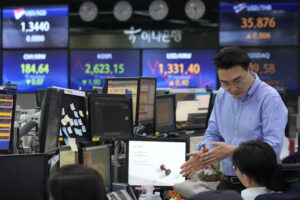BEIJING — Chinese retail sales picked up in May but industrial production growth slowed, official data showed Monday, suggesting the recovery in the world’s second-largest economy remains uneven.
Leaders have struggled to kickstart growth since an initial burst followed the end in late 2022 of stringent COVID measures that had hammered businesses and consumer activity, while a property crisis and high unemployment have dented investor confidence.
In May, retail sales — a key measure of consumer spending — grew 3.7 percent year-on-year, rebounding from April’s 2.3 percent increase, according to the National Bureau of Statistics (NBS).
The figure was also higher than the 3.0 percent increase predicted in a Bloomberg survey of analysts.
The data provided some hope that the country’s huge army of consumers was returning to high streets after years of uncertainty.
‘Generally stable’
However, industrial production slowed, with May’s 5.6 percent expansion well down from 6.7 percent in April and short of the 6.2 percent forecast in the Bloomberg survey.
The NBS characterized May’s performance as “generally stable”, adding that “the national economy continued to recover and improve”.
READ: IMF lifts China’s 2024 growth forecast to 5%
Recent weeks have seen some positive signs, with the International Monetary Fund last month revising upwards its 2024 economic growth forecast to five percent, in line with Beijing’s official target.
But significant hurdles remain, with data released Monday by the NBS showing that urban property prices across the country continued to slide in May.
READ: China rolls out new measures to fix its property crisis, spur growth
A series of measures introduced recently by authorities to support the real estate sector has “not yet boosted the demand from home buyers”, Zhang Zhiwei, President and Chief Economist at Pinpoint Asset Management, said in a note.
“Meanwhile, external demand seems to have stayed strong to sustain industrial production growing faster than retail sales,” added Zhang.


